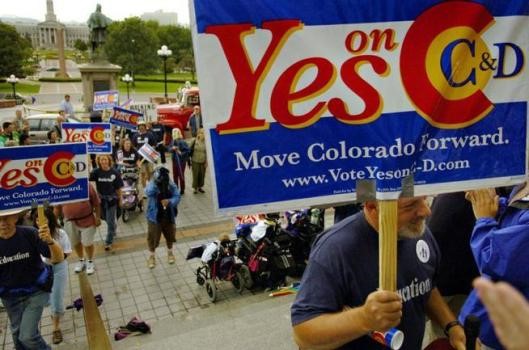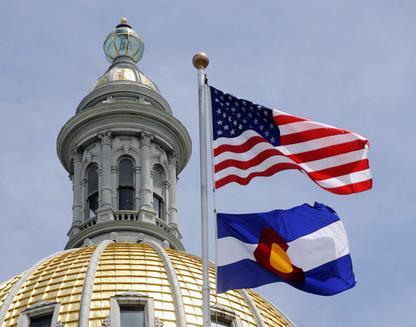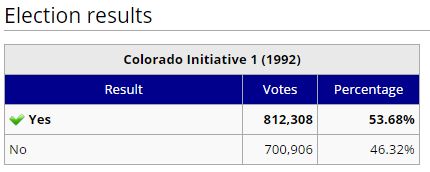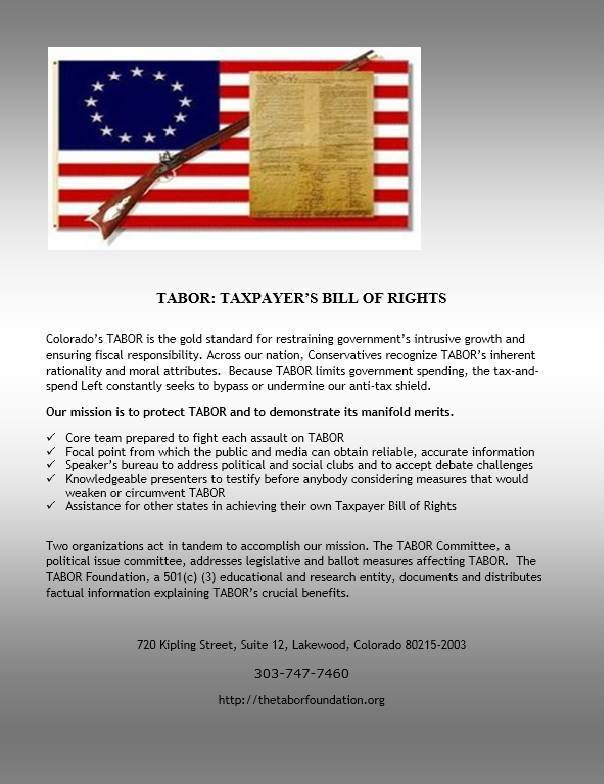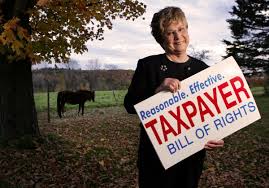|
Text of Section 20:
The Taxpayer’s Bill of Rights
(1) General provisions. This section takes effect December 31, 1992 or as stated. Its preferred interpretation shall reasonably restrain most the growth of government. All provisions are self-executing and severable and supersede conflicting state constitutional, state statutory, charter, or other state or local provisions. Other limits on district revenue, spending, and debt may be weakened only by future voter approval. Individual or class action enforcement suits may be filed and shall have the highest civil priority of resolution. Successful plaintiffs are allowed costs and reasonable attorney fees, but a district is not unless a suit against it be ruled frivolous. Revenue collected, kept, or spent illegally since four full fiscal years before a suit is filed shall be refunded with 10% annual simple interest from the initial conduct. Subject to judicial review, districts may use any reasonable method for refunds under this section, including temporary tax credits or rate reductions. Refunds need not be proportional when prior payments are impractical to identify or return. When annual district revenue is less than annual payments on general obligation bonds, pensions, and final court judgments, (4) (a) and (7) shall be suspended to provide for the deficiency.
(2) Term definitions. Within this section:
- (a) “Ballot issue” means a non-recall petition or referred measure in an election.
- (b) “District” means the state or any local government, excluding enterprises.
- (c) “Emergency” excludes economic conditions, revenue shortfalls, or district salary or fringe benefit increases.
- (d) “Enterprise” means a government-owned business authorized to issue its own revenue bonds and receiving under 10% of annual revenue in grants from all Colorado state and local governments combined.
- (e) “Fiscal year spending” means all district expenditures and reserve increases except, as to both, those for refunds made in the current or next fiscal year or those from gifts, federal funds, collections for another government, pension contributions by employees and pension fund earnings, reserve transfers or expenditures, damage awards, or property sales.
- (f) “Inflation” means the percentage change in the United States Bureau of Labor Statistics Consumer Price Index for Denver-Boulder, all items, all urban consumers, or its successor index.
- (g) “Local growth” for a non-school district means a net percentage change in actual value of all real property in a district from construction of taxable real property improvements, minus destruction of similar improvements, and additions to, minus deletions from, taxable real property. For a school district, it means the percentage change in its student enrollment.
(3) Election provisions.
- (a) Ballot issues shall be decided in a state general election, biennial local district election, or on the first Tuesday in November of odd-numbered years. Except for petitions, bonded debt, or charter or constitutional provisions, districts may consolidate ballot issues and voters may approve a delay of up to four years in voting on ballot issues. District actions taken during such a delay shall not extend beyond that period.
- (b) At least 30 days before a ballot issue election, districts shall mail at the least cost, and as a package where districts with ballot issues overlap, a titled notice or set of notices addressed to “All Registered Voters” at each address of one or more active registered electors. The districts may coordinate the mailing required by this paragraph (b) with the distribution of the ballot information booklet required by section 1 (7.5) of article V of this constitution in order to save mailing costs. Titles shall have this order of preference: “NOTICE OF ELECTION TO INCREASE TAXES/TO INCREASE DEBT/ON A CITIZEN PETITION/ON A REFERRED MEASURE.” Except for district voter-approved additions, notices shall include only:
-
- (i) The election date, hours, ballot title, text, and local election office address and telephone number.
-
- (ii) For proposed district tax or bonded debt increases, the estimated or actual total of district fiscal year spending for the current year and each of the past four years, and the overall percentage and dollar change.
-
- (iii) For the first full fiscal year of each proposed district tax increase, district estimates of the maximum dollar amount of each increase and of district fiscal year spending without the increase.
-
- (iv) For proposed district bonded debt, its principal amount and maximum annual and total district repayment cost, and the principal balance of total current district bonded debt and its maximum annual and remaining total district repayment cost.
-
- (v) Two summaries, up to 500 words each, one for and one against the proposal, of written comments filed with the election officer by 45 days before the election. No summary shall mention names of persons or private groups, nor any endorsements of or resolutions against the proposal. Petition representatives following these rules shall write this summary for their petition. The election officer shall maintain and accurately summarize all other relevant written comments. The provisions of this subparagraph (v) do not apply to a statewide ballot issue, which is subject to the provisions of section 1 (7.5) of article V of this constitution.
- (c) Except by later voter approval, if a tax increase or fiscal year spending exceeds any estimate in (b) (iii) for the same fiscal year, the tax increase is thereafter reduced up to 100% in proportion to the combined dollar excess, and the combined excess revenue refunded in the next fiscal year. District bonded debt shall not issue on terms that could exceed its share of its maximum repayment costs in (b) (iv). Ballot titles for tax or bonded debt increases shall begin, “SHALL (DISTRICT) TAXES BE INCREASED (first, or if phased in, final, full fiscal year dollar increase) ANNUALLY…?” or “SHALL (DISTRICT) DEBT BE INCREASED (principal amount), WITH A REPAYMENT COST OF (maximum total district cost), …?”
(4) Required elections. Starting November 4, 1992, districts must have voter approval in advance for:
- (a) Unless (1) or (6) applies, any new tax, tax rate increase, mill levy above that for the prior year, valuation for assessment ratio increase for a property class, or extension of an expiring tax, or a tax policy change directly causing a net tax revenue gain to any district.
- (b) Except for refinancing district bonded debt at a lower interest rate or adding new employees to existing district pension plans, creation of any multiple-fiscal year direct or indirect district debt or other financial obligation whatsoever without adequate present cash reserves pledged irrevocably and held for payments in all future fiscal years.
(5) Emergency reserves. To use for declared emergencies only, each district shall reserve for 1993 1% or more, for 1994 2% or more, and for all later years 3% or more of its fiscal year spending excluding bonded debt service. Unused reserves apply to the next year’s reserve.
(6) Emergency taxes. This subsection grants no new taxing power. Emergency property taxes are prohibited. Emergency tax revenue is excluded for purposes of (3) (c) and (7), even if later ratified by voters. Emergency taxes shall also meet all of the following conditions:
- (a) A 2/3 majority of the members of each house of the general assembly or of a local district board declares the emergency and imposes the tax by separate recorded roll call votes.
- (b) Emergency tax revenue shall be spent only after emergency reserves are depleted, and shall be refunded within 180 days after the emergency ends if not spent on the emergency.
- (c) A tax not approved on the next election date 60 days or more after the declaration shall end with that election month.
(7) Spending limits.
- (a) The maximum annual percentage change in state fiscal year spending equals inflation plus the percentage change in state population in the prior calendar year, adjusted for revenue changes approved by voters after 1991. Population shall be determined by annual federal census estimates and such number shall be adjusted every decade to match the federal census.
- (b) The maximum annual percentage change in each local district’s fiscal year spending equals inflation in the prior calendar year plus annual local growth, adjusted for revenue changes approved by voters after 1991 and (8) (b) and (9) reductions.
- (c) The maximum annual percentage change in each district’s property tax revenue equals inflation in the prior calendar year plus annual local growth, adjusted for property tax revenue changes approved by voters after 1991 and (8) (b) and (9) reductions.
- (d) If revenue from sources not excluded from fiscal year spending exceeds these limits in dollars for that fiscal year, the excess shall be refunded in the next fiscal year unless voters approve a revenue change as an offset. Initial district bases are current fiscal year spending and 1991 property tax collected in 1992. Qualification or disqualification as an enterprise shall change district bases and future year limits. Future creation of district bonded debt shall increase, and retiring or refinancing district bonded debt shall lower, fiscal year spending and property tax revenue by the annual debt service so funded. Debt service changes, reductions, (1) and (3) (c) refunds, and voter-approved revenue changes are dollar amounts that are exceptions to, and not part of, any district base. Voter-approved revenue changes do not require a tax rate change.
(8) Revenue limits.
- (a) New or increased transfer tax rates on real property are prohibited. No new state real property tax or local district income tax shall be imposed. Neither an income tax rate increase nor a new state definition of taxable income shall apply before the next tax year. Any income tax law change after July 1, 1992 shall also require all taxable net income to be taxed at one rate, excluding refund tax credits or voter-approved tax credits, with no added tax or surcharge.
- (b) Each district may enact cumulative uniform exemptions and credits to reduce or end business personal property taxes.
- (c) Regardless of reassessment frequency, valuation notices shall be mailed annually and may be appealed annually, with no presumption in favor of any pending valuation. Past or future sales by a lender or government shall also be considered as comparable market sales and their sales prices kept as public records. Actual value shall be stated on all property tax bills and valuation notices and, for residential real property, determined solely by the market approach to appraisal.
(9) State mandates. Except for public education through grade 12 or as required of a local district by federal law, a local district may reduce or end its subsidy to any program delegated to it by the general assembly for administration. For current programs, the state may require 90 days notice and that the adjustment occur in a maximum of three equal annual installments.[1] |
